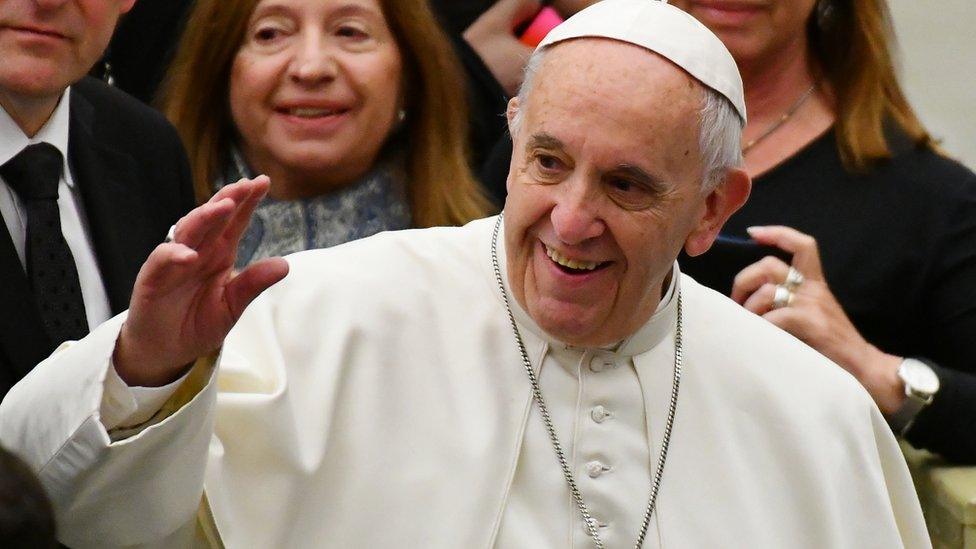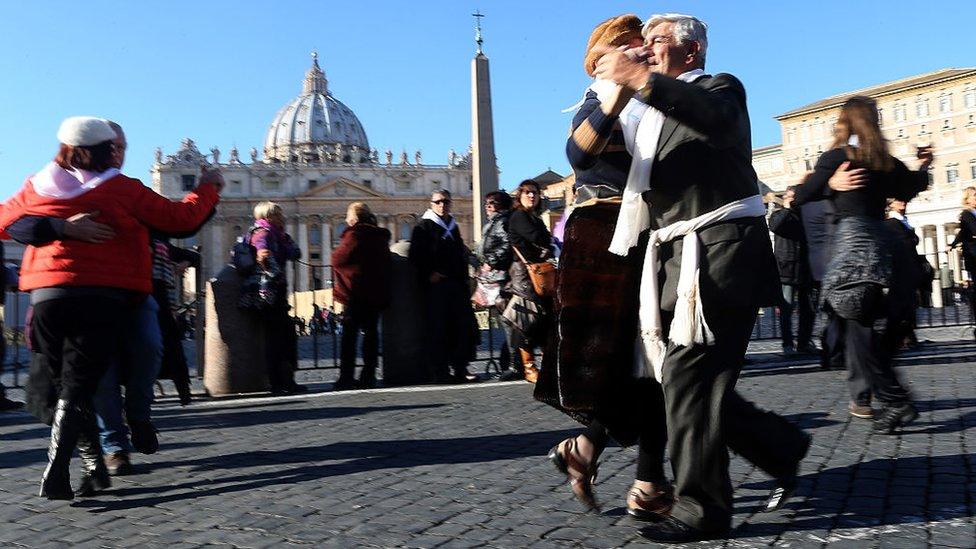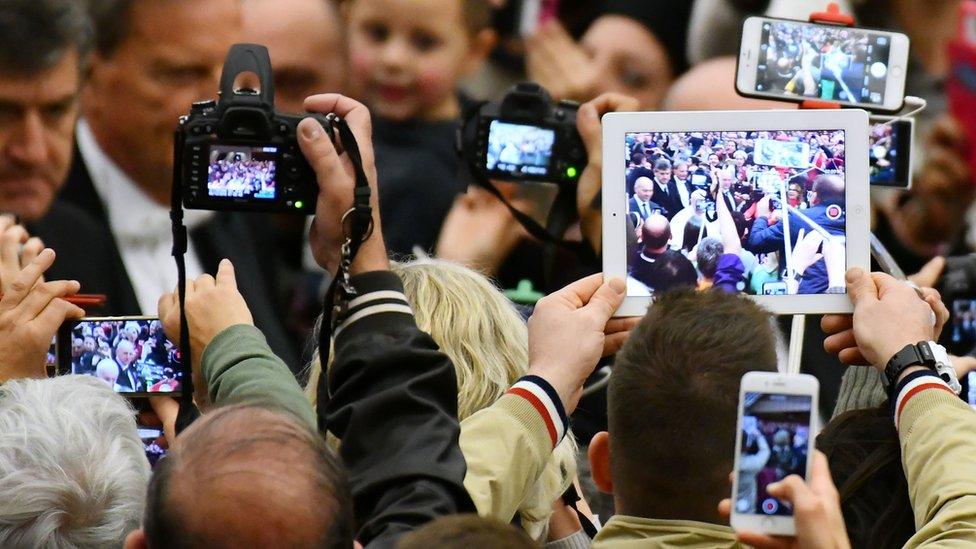Pope's zeal for change undimmed as he reaches 80
- Published

Pope Francis, the first Latin American pontiff, turns 80 on Sunday: it's the age at which the cardinals who will elect his successor become ineligible to vote.
The papacy is no longer a lifetime job. Pope Francis could decide to resign at some point, following the example of his predecessor, Emeritus Pope Benedict, frail but still living in retirement inside the walls of the Vatican at the age of 89.
Under a new papal decree, all senior church officials working in the Vatican now automatically lose their jobs on their 80th birthday. But not Pope Francis.
Although he has intimated that he expects his papacy to be a short one, he gives the impression that his as yet incomplete bureaucratic reforms at the Vatican demand that he should stay on as Bishop of Rome for some years to come.
The process of shaping a new generation of church leaders, of promoting new bishops and cardinals within the church in line with his policy of creating "a church of the poor", is necessarily slow.
He has so far replaced only one-third of the members of the electoral college which will eventually choose his successor. The men who used to run the Vatican under the two very different popes whom he succeeded, John Paul II and Benedict XVI, still outnumber his own nominees to top posts.
Pope Francis's reforms polarise the Vatican
Pope Francis names 17 new cardinals of Roman Catholic Church
Pope Francis' health seems good, despite the fact he lost a lung through illness when he was young. He suffers from sciatica, and leans on the arm of his master of ceremonies when officiating at Vatican masses. But when you see him close up, he seems vital as well as gregarious.
He rarely takes time off, even during the Vatican's long traditional summer holidays. He abandoned the roomy penthouse apartment used by popes for the past century in favour of a tiny suite in the Vatican guesthouse, and turned his back upon the palatial papal summer residence at Castelgandolfo which is now a museum.

Not everyone will dance the tango to celebrate Pope Francis reaching 80

Tourists are keen to visit the elegant papal retreat at Castelgandolfo - less so the austerity-minded Pope Francis

The Vatican's media operation is among Francis' targets for reform
Catholic couples danced to the notes of the tango on the cobblestones of Saint Peter's square to celebrate one of the Argentinian Pope's previous birthdays - but some of Pope Francis' 120 cardinals, his senior advisers, are now suggesting that he may be out of tune - or has become tone deaf to Catholic traditional teaching.
Four of them, from Italy, the United States and Germany have even accused him of sowing confusion among the faithful. They asked him to explain exactly where he stands on official church teaching on the remarriage of divorced couples and on the ethics of same-sex unions. He did not reply.
Pope Francis remains unfazed by such criticism.
He claims he is "not losing any sleep" over their challenge to his leadership, which he has referred to as "mean-spirited opinions". He has a refreshingly frank and direct style of speaking, both in public and in private.
He often discards texts prepared for him by his speechwriters in favour of off-the-cuff remarks. In Spanish and Italian, the languages in which he is most comfortable, he still relishes the use of the pithy phrases of his native Buenos Aires dialect.
Whirlwind tours
Unlike his Polish and German predecessors, Pope Francis has for four years resisted the temptation to revisit his native country, Argentina.
His travel plans for 2017 include a whirlwind trip to Portugal, an Asian tour which would take him to India, and two predominantly Muslim countries, Bangladesh and Indonesia, and perhaps a rapid visit to Colombia to celebrate the end of the long civil war there.
The jury is still out on what sort of legacy Pope Francis will leave behind him at the Vatican if he abdicates or when he dies.
The pace of reform has been painfully slow. An advisory council of cardinals from outside the Vatican which the pope set up apparently to bypass the often obstructive bureaucracy of the church headquarters, the Holy See, continues to meet diligently every three months, so far without reaching any radical decisions.
The Vatican Bank has been forced to turn over a new leaf, publishing its balance sheet and promising to avoid future accusations of money-laundering.
The Vatican's accounts are being professionally audited for the first time. Another papal committee has been created to deal with the long history of clerical paedophile scandals and for the future protection of victims of predator priests.
The Vatican's media operations are being merged under new leadership.
The key question, however, is whether the first ever Pope to take the name of Francis, the medieval saint who embraced poverty, could eventually be succeeded by a second Pope Francis. The next papal election is bound to be bitterly contested when the cardinals gather in Rome. It will be the mother of all conclaves.